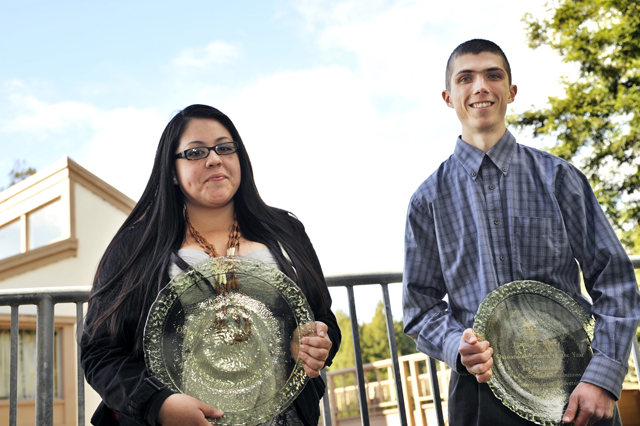
James Apple, Environmental Resources Engineering major from Palo Alto, is focused on renewable energy and air quality. Vynessa Ortiz, Political Science/Ethnic Studies major from Long Beach, is devoted to community advocacy and advancing Native Americans.
The two seniors were named Outstanding Students of the Year on April 29 at ceremonies hosted by President Rollin Richmond. They will be honored again at Commencement exercises on May 15 in Redwood Bowl.
Apple, who will graduate with a nearly perfect (3.96) cumulative GPA, is a student assistant at the Schatz Energy Research Center and president of the Renewable Energy Student Union (RESU).
Ortiz put in five full years of service in multiple roles at the Women's Resource Center, while at the same time leading social justice and multicultural workshops and making important contributions to the Educational Opportunity Program.
Apple said he was bowled over by the award—"I had no idea that this would be coming"—despite being the lead engineer of the winning 10-member Humboldt State team that days before had captured a $75,000 technology design award from the U.S. Environmental Protection Agency. The award is to foster sustainable energy use in the developing world. The entire team of undergraduate and graduate students was drawn from the RESU club.
Environmental Resources Engineering Professor Eileen Cashman has known Apple throughout his four years at Humboldt State, and said he was the department's unanimous choice for the Outstanding Student award. "The entire faculty instantly agreed," she recalled, characterizing Apple as a respected leader among his peers, a talented researcher, and a humble person and consummate team player who has "an intellectual passion for energy."
Cashman said the RESU club's success in the national EPA contest among more than 40 schools was due in large part to Apple. "He played a leadership role in developing the original idea into a successful proposal," a prototype device to reduce brownouts in village mini-grid systems in countries like Bhutan and Thailand.
Headed to Bhutan this summer and then to Stanford to pursue a master's degree, Apple looks forward to a career in environmental consulting in renewable energy and air quality. He praised Humboldt State's Department of Environmental Resources Engineering, and said he appreciated his research opportunities at the Schatz Energy Research Center and experience with student clubs.
Like Apple, Vynessa Ortiz was lured to HSU by its strengths in the environmental sciences. But the University's strong emphasis on social justice got her interested in civic activism, and she switched to political science and ethnic studies.
"Once I got in touch with some of the communities on campus and the work they were doing, I fell in love with HSU's social advocacy and that's what kept me here," the Long Beach native said.
Staff member Christine Matta, coordinator of Student Judicial Education, nominated Ortiz. She noted that Ortiz is the rare person who has superior leadership capabilities in tandem with a big heart and compassion. "It was clear to me from the moment I met Vynessa that she was a young woman with a mission to be successful and to serve her community. Vynessa has the ability to use her wide range of experiences as a woman of color, low-income first-generation college student and her knowledge of the campus community to connect with students with whom she interacts, without discounting their experiences."
Matta also praised Ortiz as a student affairs professional of indefatigable energy. Asked how she comes by her dynamism and vitality, Ortiz jokes, "From coffee!" But she hastens to add, "I feed off other people's energy; I don't do any of this stuff on my own. It's a community effort and I'm just lucky enough to be able to represent these communities, and collaborate with people. You'd be surprised how much you can do, collaborating with others."
After a work stint, Ortiz intends to go to law school and specialize in federal Indian law, including such issues as sovereignty. "I'm Mexican and Chippewa-Cree," she said, "and eventually I want to work with my tribe in Montana, in a village of 3,000 people, about 50 miles from the Canadian border."